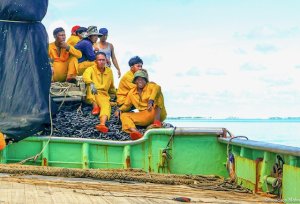Written by Dr. Wetjens Dimmlich

Photo kindly provided by Francisco Blaha
Back to the Tuna World
Returning to the Western and Central Pacific Fisheries Commission (WCPFC) after a two-year absence, it was heartening to be greeted with such warmth by many familiar faces in the tuna world. While the intervening years brought a shift in perspective, moving from a central role in decision-making within the FFA membership to an observer status with the Global Tuna Alliance (GTA), many aspects of the WCPFC felt reassuringly familiar. Observing the numerous delegates seemingly adhering to their long-established positions was reminiscent of slipping into a comfortable pair of old slippers. The experience provided me with an invaluable opportunity to assess how the GTA’s advocacy efforts, on behalf of its partners, could be most effectively leveraged to advance progress on key issues within the WCPFC framework.
Expectations and Outcomes
The 21st session of the Western and Central Pacific Fisheries Commission (WCPFC21) was highly anticipated by many participants, with expectations of advancements in several key areas such as fisheries management, labour standards, and environmental protection. While the meeting yielded a landmark achievement in the adoption of binding crew labour standards, progress on other issues was limited due to disagreements and delays.
Expectations
Outcomes
Analysis
The adoption of binding crew labour standards at WCPFC21 demonstrates the power of collective action and the growing recognition of fishers’ human rights within the tuna industry. However, the delayed implementation and lack of progress on other critical issues such as transshipment and environmental protection highlight the ongoing challenges and complexities in managing tuna fisheries effectively.
What was evident was a recurring pattern of resistance to change and a prioritisation of national economic interests over broader sustainability goals by certain CCMs. This behaviour, not limited just to the WCFPC, has been identified as a contributing factor to the limited effectiveness of RFMOs in addressing crucial issues like overfishing.
Unfortunately for those seeking positive and timely change, the WCPFC’s consensus-based decision-making process may be hindering progress. This process gives significant power to individual members who can easily block or delay the adoption of necessary measures, even when supported by a majority. Some stakeholders have called for a transition towards a more accountable and transparent decision-making model, possibly involving voting, to overcome these limitations, but it is doubtful such systems would ever be implemented.
Looking Ahead
Despite the setbacks, WCPFC21’s adoption of crew labour standards provides a positive example for other RFMOs and sets a precedent for prioritising worker welfare within the fishing industry. Advocacy efforts will need to continue to ensure the timely implementation of these standards and push for progress on other crucial issues such as transshipment reform, enhanced observer coverage, and the adoption of science-based conservation measures for seabirds, sharks, and other marine life.